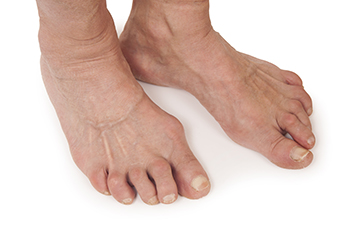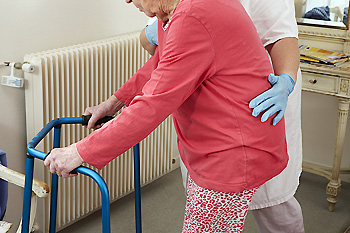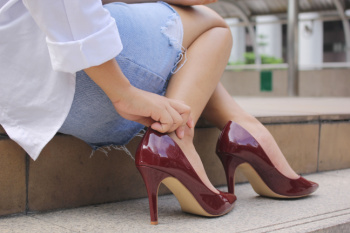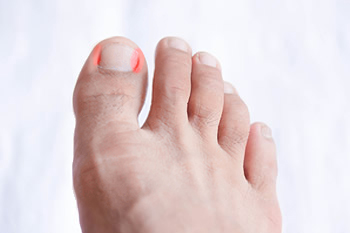Items filtered by date: June 2024
How Rheumatoid Arthritis Affects the Feet

Rheumatoid arthritis, or RA, profoundly affects the feet, leading to significant discomfort and mobility issues. The inflammation caused by RA targets the joints, resulting in pain, swelling, and stiffness, particularly in the toes and the balls of the feet. This inflammation can damage the cartilage and bones over time, causing deformities such as hammertoes and bunions. The pain and swelling often make walking difficult and can lead to a reduced range of motion. Additionally, the arches of the feet may flatten, altering gait and balance. Effective management of RA in the feet involves a combination of medications to control inflammation and supportive footwear to reduce pressure on affected areas. If you have pain in your feet and toes, it is suggested that you confer with a podiatrist who can accurately diagnose and help you manage RA or whatever might be going on.
Because RA affects more than just your joints, including the joints in your feet and ankles, it is important to seek early diagnosis from your podiatrist if you feel like the pain in your feet might be caused by RA. For more information, contact one of our podiatrists of Pocono Foot & Ankle Consultants. our doctors will assist you with all of your podiatric concerns.
What Is Rheumatoid Arthritis?
Rheumatoid Arthritis (RA) is an autoimmune disorder in which the body’s own immune system attacks the membranes surrounding the joints. Inflammation of the lining and eventually the destruction of the joint’s cartilage and bone occur, causing severe pain and immobility.
Rheumatoid Arthritis of the Feet
Although RA usually attacks multiple bones and joints throughout the entire body, almost 90 percent of cases result in pain in the foot or ankle area.
Symptoms
- Swelling and pain in the feet
- Stiffness in the feet
- Pain on the ball or sole of feet
- Joint shift and deformation
Diagnosis
Quick diagnosis of RA in the feet is important so that the podiatrist can treat the area effectively. Your doctor will ask you about your medical history, occupation, and lifestyle to determine the origin of the condition. Rheumatoid Factor tests help to determine if someone is affected by the disease.
If you have any questions please feel free to contact our offices located in Stroudsburg, Nazareth, and Easton, PA . We offer the newest diagnostic and treatment technologies for all your foot and ankle needs.
Foot Pain and Falls Prevention for Elderly
 Foot pain is a significant concern among the elderly population that contributes to an increased risk of falls and related injuries. As people age, they may experience various foot problems such as arthritis, neuropathy, and decreased sensation, any of which can affect balance and stability. Foot pain can make it challenging for older adults to walk safely and confidently, increasing the likelihood of slips, trips, and falls. These falls can result in serious injuries like fractures, head injuries, and a loss of functioning independently. Therefore, it is important for seniors experiencing foot pain to seek professional care from a podiatrist to address underlying issues and implement preventive measures. Changes in regimens like wearing proper footwear, doing foot exercises, and getting regular foot examinations can help reduce foot pain and minimize the risk of falls, enabling older adults to maintain their mobility and quality of life. If you are elderly or someone you know who is elderly experiences foot pain or frequent falls, it is suggested that you make an appointment with a podiatrist for an evaluation.
Foot pain is a significant concern among the elderly population that contributes to an increased risk of falls and related injuries. As people age, they may experience various foot problems such as arthritis, neuropathy, and decreased sensation, any of which can affect balance and stability. Foot pain can make it challenging for older adults to walk safely and confidently, increasing the likelihood of slips, trips, and falls. These falls can result in serious injuries like fractures, head injuries, and a loss of functioning independently. Therefore, it is important for seniors experiencing foot pain to seek professional care from a podiatrist to address underlying issues and implement preventive measures. Changes in regimens like wearing proper footwear, doing foot exercises, and getting regular foot examinations can help reduce foot pain and minimize the risk of falls, enabling older adults to maintain their mobility and quality of life. If you are elderly or someone you know who is elderly experiences foot pain or frequent falls, it is suggested that you make an appointment with a podiatrist for an evaluation.
Preventing falls among the elderly is very important. If you are older and have fallen or fear that you are prone to falling, consult with one of our podiatrists from Pocono Foot & Ankle Consultants. our doctors will assess your condition and provide you with quality advice and care.
Every 11 seconds, an elderly American is being treated in an emergency room for a fall related injury. Falls are the leading cause of head and hip injuries for those 65 and older. Due to decreases in strength, balance, senses, and lack of awareness, elderly persons are very susceptible to falling. Thankfully, there are a number of things older persons can do to prevent falls.
How to Prevent Falls
Some effective methods that older persons can do to prevent falls include:
- Enrolling in strength and balance exercise program to increase balance and strength
- Periodically having your sight and hearing checked
- Discuss any medications you have with a doctor to see if it increases the risk of falling
- Clearing the house of falling hazards and installing devices like grab bars and railings
- Utilizing a walker or cane
- Wearing shoes that provide good support and cushioning
- Talking to family members about falling and increasing awareness
Falling can be a traumatic and embarrassing experience for elderly persons; this can make them less willing to leave the house, and less willing to talk to someone about their fears of falling. Doing such things, however, will increase the likelihood of tripping or losing one’s balance. Knowing the causes of falling and how to prevent them is the best way to mitigate the risk of serious injury.
If you have any questions, please feel free to contact our offices located in Stroudsburg, Nazareth, and Easton, PA . We offer the newest diagnostic and treatment technologies for all your foot care needs.
Finding Heels for Your Foot Shape

Choosing the right pair of high heels involves more than just style, it is about finding a fit that complements your unique foot shape. For flat feet, look for heels with built-in arch support or cushioning to provide stability and prevent discomfort. High arches benefit from heels with a lower height and extra cushioning to alleviate pressure on the instep. If you have narrow feet, opt for pointy-toed heels that offer a snug fit and elongate the appearance of the foot. Conversely, individuals with wider feet may find comfort in rounded or peep-toe styles that provide ample room in the toe box. Additionally, those with bunions or other foot irregularities may prefer heels with soft, stretchy materials or adjustable straps to accommodate any protrusions or sensitivities. Wearing heels can negatively affect the feet, and it is beneficial to choose the right shape and style for your feet. If you have developed foot conditions from wearing heels, it is suggested that you consult a podiatrist who can offer appropriate treatment, and guide you on choosing the right pair for you.
High heels have a history of causing foot and ankle problems. If you have any concerns about your feet or ankles, contact one of our podiatrists from Pocono Foot & Ankle Consultants. our doctors can provide the care you need to keep you pain-free and on your feet.
Effects of High Heels on the Feet
High heels are popular shoes among women because of their many styles and societal appeal. Despite this, high heels can still cause many health problems if worn too frequently.
Which Parts of My Body Will Be Affected by High Heels?
- Ankle Joints
- Achilles Tendon – May shorten and stiffen with prolonged wear
- Balls of the Feet
- Knees – Heels cause the knees to bend constantly, creating stress on them
- Back – They decrease the spine’s ability to absorb shock, which may lead to back pain. The vertebrae of the lower back may compress.
What Kinds of Foot Problems Can Develop from Wearing High Heels?
- Corns
- Calluses
- Hammertoe
- Bunions
- Morton’s Neuroma
- Plantar Fasciitis
How Can I Still Wear High Heels and Maintain Foot Health?
If you want to wear high heeled shoes, make sure that you are not wearing them every day, as this will help prevent long term physical problems. Try wearing thicker heels as opposed to stilettos to distribute weight more evenly across the feet. Always make sure you are wearing the proper shoes for the right occasion, such as sneakers for exercising. If you walk to work, try carrying your heels with you and changing into them once you arrive at work. Adding inserts to your heels can help cushion your feet and absorb shock. Full foot inserts or metatarsal pads are available.
If you have any questions please feel free to contact our offices located in Stroudsburg, Nazareth, and Easton, PA . We offer the newest diagnostic and treatment technologies for all your foot and ankle needs.
Prevention Tips for Ingrown Toenails

Ingrown toenails are a painful condition where the side or corner of a toenail grows into the soft flesh surrounding it. This often leads to pain, swelling, and sometimes infection, especially in the big toe. It is important to use proper techniques to prevent the formation of an ingrown toenail. Always trim your toenails dry to avoid bending or tearing them, and cut them straight across rather than rounding the edges. This prevents the nail from digging into the skin as it grows. Avoid trimming cuticles, as they act as barriers against infection, and use appropriate tools like manicure scissors or dedicated toenail clippers. It is also important to have separate clippers for your fingers and toes to prevent cross-contamination. If you have diabetes or another condition that impairs blood flow to your feet, you are at a higher risk of complications from ingrown toenails. Therefore, extra caution is warranted. Regularly practicing these proper nail care habits can significantly reduce the likelihood of developing ingrown toenails. However, if you experience severe pain, swelling, or signs of infection, it is suggested that you schedule an appointment with a podiatrist for treatment.
Ingrown toenails can become painful if they are not treated properly. For more information about ingrown toenails, contact one of our podiatrists of Pocono Foot & Ankle Consultants. our doctors can provide the care you need to keep you pain-free and on your feet.
Ingrown Toenails
Ingrown toenails occur when a toenail grows sideways into the bed of the nail, causing pain, swelling, and possibly infection.
Causes
- Bacterial infections
- Improper nail cutting such as cutting it too short or not straight across
- Trauma to the toe, such as stubbing, which causes the nail to grow back irregularly
- Ill-fitting shoes that bunch the toes too close together
- Genetic predisposition
Prevention
Because ingrown toenails are not something found outside of shoe-wearing cultures, going barefoot as often as possible will decrease the likeliness of developing ingrown toenails. Wearing proper fitting shoes and using proper cutting techniques will also help decrease your risk of developing ingrown toenails.
Treatment
Ingrown toenails are a very treatable foot condition. In minor cases, soaking the affected area in salt or antibacterial soaps will not only help with the ingrown nail itself, but also help prevent any infections from occurring. In more severe cases, surgery is an option. In either case, speaking to your podiatrist about this condition will help you get a better understanding of specific treatment options that are right for you.
If you have any questions please feel free to contact our offices located in Stroudsburg, Nazareth, and Easton, PA . We offer the newest diagnostic and treatment technologies for all your foot and ankle needs.
